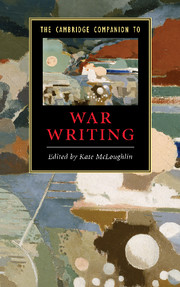4 - War zones
from Part I - Themes
Published online by Cambridge University Press: 28 January 2010
Summary
Approaching the war zone
War zones destructure any narrative that attempts to describe them with powers of menace capable of warping civilian space-time: the war story's wartime is spatialized into different zones of mind-threatening danger; its narrative coordinates are temporalized into overlapping waves of presents and pasts and futures, lives and afterlives and war-machinic phases intermixed. The approach to the war is a journey into this war-scrambled spatio-temporal zone, and has classic status in any war story. Romance and folk tale establish the generic scene. The hero of the fourteenth-century poem Gawain and the Green Knight enters a wild, rugged landscape at the end of his movement through dangerous territory to meet the creature of unreason, the Green Knight. The battle zone is a place of sacrifice, a testing of honor and virtue, a space of punishment. But it is at its core a zone which picks up and decreates the features of Gawain's old world - the green chapel, the courtliness of the enemy, the parade of erotic as well as military honor - by feeding on forces outside Gawain's control, his fear of his own darkest fears, his guilt, his alienation from culture. All this is concentrated into the terrible whirring, rushing, ringing noise Gawain hears as he makes his way up through the “corsedest kyrk.”
Browning, in “Childe Roland to the Dark Tower Came” (1855), working with similar folk material, imagines the journey to warfare as an inward spiritual exploration of nature as a series of devastated landscapes, staging posts to catastrophe. All features of the ordinary world are infused with uncanny menace in the combatant’s mind as he travels to the war zone, dark memories fusing with apprehensions and confused sensations. Death as the Dark Tower casts its shadow over all things, the unmasked world revealing itself as always already destroyed.
- Type
- Chapter
- Information
- The Cambridge Companion to War Writing , pp. 38 - 46Publisher: Cambridge University PressPrint publication year: 2009
- 1
- Cited by



